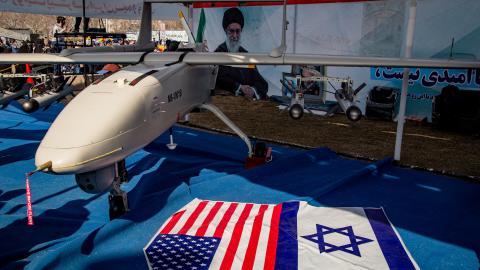Three Things about the Israel-Hamas War is a series from the Hudson Center for Peace and Security in the Middle East. Every week, Hudson Senior Fellows Michael Doran, Can Kasapoğlu, and Jonathan Schachter will join Research Fellow Zineb Riboua to offer an analysis of one thing—and one thing only—that is of particular importance to understand the Israel-Hamas war. Subscribe here.
Read their analysis below.
1. President Biden will recognize a Palestinian state in the early summer.
“We support the establishment of an independent Palestinian state, and we do a lot of work inside the government to think about how to bring that about,” said State Department Spokesperson Matthew Miller on January 31. Jerusalem absorbed the full weight of this statement during Secretary of State Antony Blinken’s recent visit to Israel. Last Friday, Maariv, a major Israeli newspaper, reported on the dismay Israeli officials felt over “the Biden administration falling in love with the idea of the establishment of a Palestinian state and unilateral recognition as a means of pressure on Israel.”
The administration fell in love with the idea amid a debate between the two groups that struggle for supremacy within its upper ranks: those who are anti-Hamas and those who favor an immediate ceasefire. The top officials, such as President Joe Biden himself, Secretary of State Antony Blinken, and National Security Advisor Jake Sullivan, belong to the former group. Senior career bureaucrats fill the ranks of the latter faction.
But both groups erroneously believe that the underlying cause of the October 7 terror attack was the failure of Israelis and Palestinians to make peace—and that the Israeli right wing is the greatest impediment to a two-state solution. Both also harbor the misconception that Israeli Prime Minister Benjamin Netanyahu is bad for the United States and for the causes of peace and stability. In addition, they both think that Biden’s support for Israel’s war against Hamas has hurt him politically among key domestic constituencies.
This perceived political damage has given the career bureaucrats’ argument a significant boost. While the White House’s support for Israel against Hamas continues, Biden and his team are now looking for ways to hammer Netanyahu publicly. Because the recognition of a Palestinian state is an election ploy as much as a foreign policy strategy, the Biden team will seek to announce it by early summer—just in time to campaign in the presidential election on its “historic achievement.”
— Michael Doran
2. The Houthis’ unmanned surface vehicle deterrent is exacerbating the conflict in the Red Sea.
A careful assessment of social media releases from US Central Command (CENTCOM) reveals it has conducted a growing number of self-defense strikes against unmanned surface vessels (USVs) controlled by the Houthi militia. CENTCOM characterizes these strikes as preventive first punches against combat assets that are being prepared for imminent attack roles. The Houthis’ increasing reliance on USVs is yet another sign of Iran’s involvement in the unfolding conflict, as well as another lucrative source of data for Tehran’s asymmetric naval warfare strategy.
Drone boats provide the Houthis with a critical capability that could further degrade the security situation in the Red Sea. These assets have a robust combat record. In January 2017, a Houthi drone boat targeted the Saudi frigate al-Madinah, inflicting casualties on the Saudi Navy. Agile and explosive, USVs pose problems for conventional vessels. As Ukraine has demonstrated in its attacks on Russia’s Black Sea Fleet, such assets can prove effective even against large warships.
The design of the Houthis’ drone boats hints at the scope of Iran’s direct involvement in the war. A technical analysis of captured USVs reveals that the fingerprints of Tehran’s defense technological and industrial base are on every component of the Houthis’ naval drones, from their command and control and navigation systems to the explosive devices and connecting cables they employ.
Iran has already been using swarm boats to disrupt vital sea lanes and shipping chokepoints. A systematic transformation of these boats into robotic systems would further amplify the threat posed by Tehran’s asymmetric naval warfare efforts—and provide Iran’s Islamic Revolutionary Guard Corps with the data it needs to further hone its operations.
— Can Kasapoğlu
3. The Biden administration’s Michigan apology tour suggests that domestic political considerations will increasingly influence its policy toward Israel.
In the early weeks of the war in Gaza, President Biden spoke powerfully of his support for Israel and unequivocally in his condemnation of Hamas. At the same time, he remained noticeably silent regarding American supporters of Hamas, even as they called for the mass murder of Jews, tore down the US flag, and attempted to climb the White House fence.
Now, with Arab-American and Muslim-American leaders threatening not to support Biden in November’s election, the White House has shifted gears from silence to pandering.
On February 1, while aboard Air Force One, the president reportedly placed a telephone call to infamously antisemitic Michigan Representative Rashida Tlaib—who has accused Biden of supporting the genocide of the Palestinian people—on his way to a campaign stop in Detroit. Last week, the president dispatched high-level administration officials to Michigan, where they met with community representatives, including a Dearborn newspaper publisher who has proclaimed that Hamas is “not a terrorist organization,” and a state representative who has lamented the “70-year-plus occupation” (i.e., not since 1967, but since Israel’s founding).
The White House delegation, led by Principal Deputy National Security Adviser Jon Finer and US Agency for International Development Administrator Samantha Power, appears to have traveled to Michigan less to assert the forthright moral position that murder, rape, and kidnapping are contrary to American values and will never advance Palestinian national aspirations, than to conduct a prolonged session of self-flagellation, acknowledge administration “missteps,” and voice criticism of the Israeli government.
The inclusion of Power in the delegation makes sense, as the agency she heads is responsible for the provision of American humanitarian aid, including to the Palestinians. That said, because she is perhaps best known for writing a book on genocide, her presence was undoubtedly a gesture toward the accusation that has been leveled against Israel before the International Court of Justice—an accusation that Secretary of State Antony Blinken has rightly called “meritless.”
Finer, for his part, expressed skepticism about Israel’s willingness “to do the hard thing that’s going to be required of them, which is meaningful steps for the Palestinians on the question of two states.” Finer served as the chief of staff to then-Secretary of State John Kerry during the Obama administration. He surely knows that Israel accepted, albeit with reservations, Kerry’s 2014 “framework” for negotiations toward a permanent solution to the conflict—a framework from which Palestinian negotiators walked away.
The White House team’s Michigan apology tour signals an effort to walk a tightrope between the 80 percent of American voters who support Israel in its war on Hamas and the loud but influential minority threatening the president. Much of this latter group at best is silent about Hamas’s terrorist atrocities and at worst endorses the group’s murderous goals and methods. It appears that American politics will increasingly influence US policy toward the war, at the likely expense of both the truth and moral clarity. Hamas undoubtedly understands that its incentives for putting more Palestinian civilians in harm’s way will increase accordingly.
— Jonathan Schachter


















